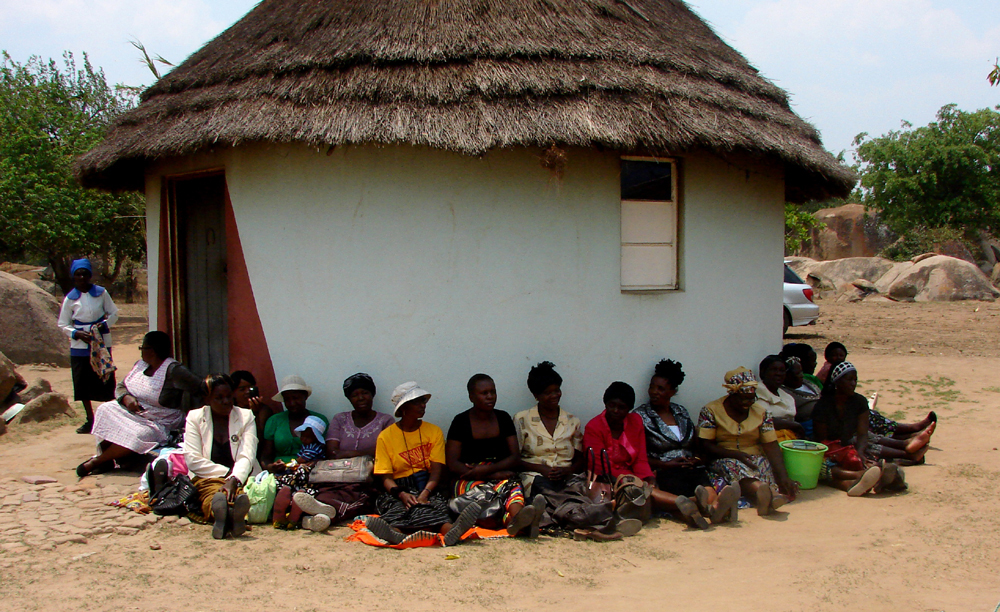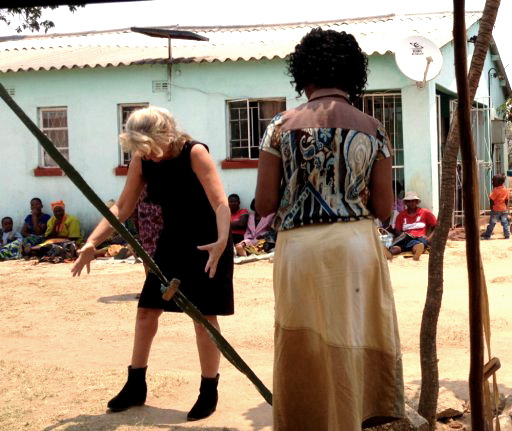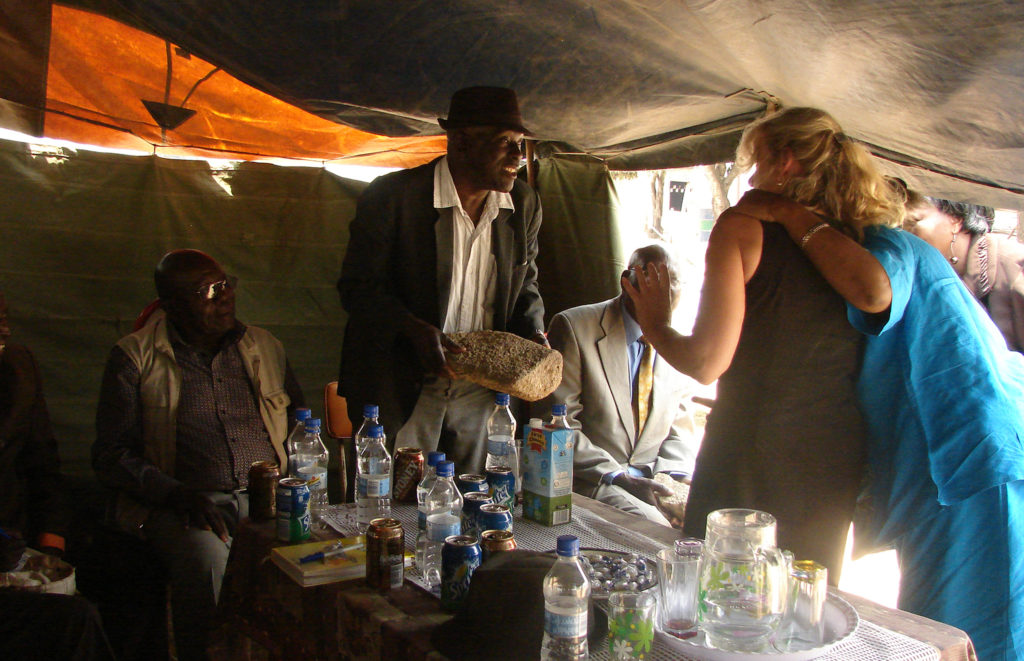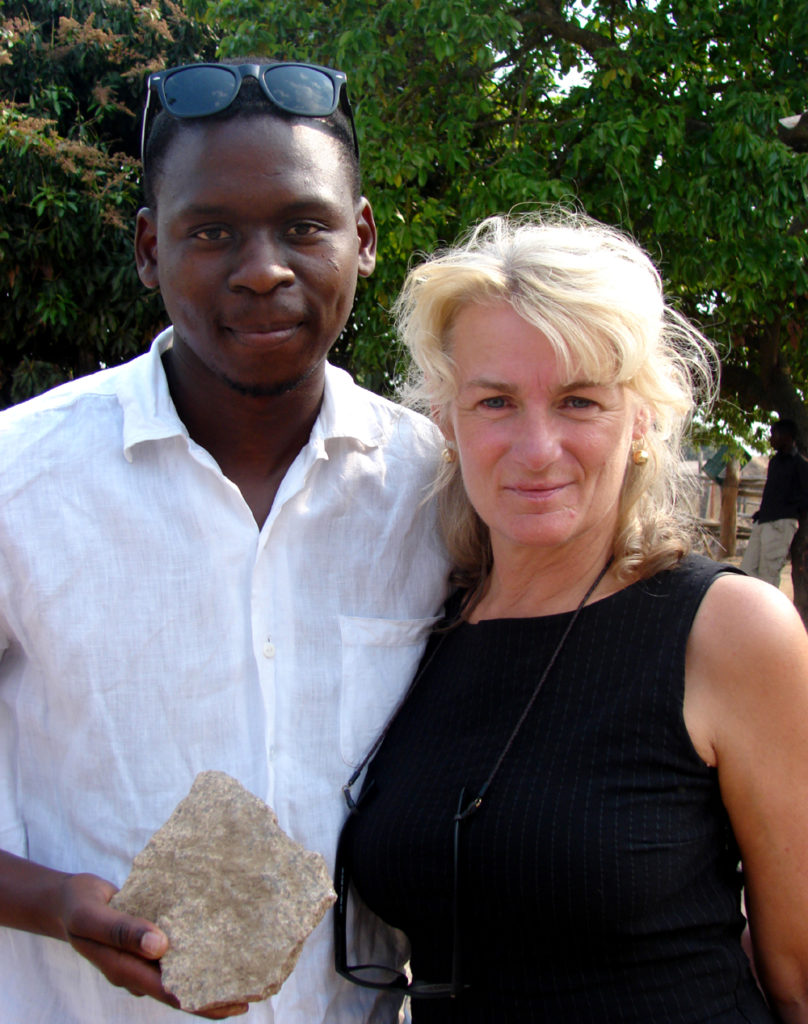Talking to the men of Seke: The story of the rocks
The group of women that visited the Harare Colloquium included women from a political and NGO background. They traveled from South Sudan, Uganda, Burundi, Zimbabwe, Liberia, the Philippines and the Netherlands. They visited the village Seke for a long and pleasant afternoon. The whole village was present.
Of the group we worked with in the initial sessions, three of these women live in Seke. They welcomed the Colloquium and offered them a place to sit next to the men of Seke, under the roof, protected from the sun. At first glance, I could see the women of the village sitting on the ground or leaning against the buildings. Men and women were strictly separated.

Several of the guests were asked to come forward and share their knowledge about women leadership. The text below is my story.
Talking to the men in Seke, Zimbabwe
As we traveled towards your beautiful village, I chose to sit in the front seat of the bus to make sure I had the best view to experience the impressive rocks of Zimbabwe. Zimbabwe means ‘Home of the rocks’ I was told. The rocks are an important characteristic for Zimbabwe, isn’t it? Some of the rocks are so big, one cannot carry them alone. I asked if they agreed and all the men shook their heads in union. You need all the community members to carry the load. You could ask me: “Why carry the rocks? They stand over there and we can keep them where they are. There is no need to change the situation.” Well, allow me to tell you a story. I call it “The story of the rocks”.
The rocks of Zimbabwe characterise your land, the very essence of your country. You as chiefs and headsmen are like the rocks of Zimbabwe. Leadership, culture and protection for its people, those are the rocks. Do you agree with this? The men agreed.

Did I understand you correctly that you consider yourself as the first one, the first one whose primary responsibility it is to carry the culture? The men agreed. In my opinion, leadership is about the relationship between leaders and followers. Without followers a leader isn’t a leader at all, right? The men agreed.
So for leaders it is crucial to give people a reason to follow them. When they trust that you, the leader, will do the right thing for them, they will follow. So when they trust you with no reason to fear you, they are ready to follow with their own free will. And trust is something you can have if your leader doesn’t harm you. When you are protected. When you know he will hear you and think of your needs. This kind of trust can emerge when leaders maintain zero tolerance to violence.
Zero tolerance to violence
Violence in the home, violence between community members, violence against the community. Zero tolerance to violence can keep your people strong, with no trauma, no pain, no mistrust and no injuries. You can keep them strong without the fear of violence. The rocks are the same way; they characterise Zimbabwean chiefs as a wall of protection for their people, and with zero tolerance to violence that is also a characterisation of the culture as led by chiefs and headsmen.
Zero tolerance to violence keeps women strong. Rape and violence makes them weak, vulnerable and injured both mentally and physically. And that’s not a wise thing for you to let happen. Women who are strong can assist in strengthening the community by negotiating, building schools and organising prosperity. Vulnerable women who are traumatized by rape and violence are struggling, perhaps silently. They cannot contribute to the community the way they could have and their once potential is lost. A leader needs all the strength in his community to build a strong and resilient society. I do not want to criticise the principle of patriarchy because that is the way you have organized co-existence in your culture. But patriarchy brings responsibility along with it, especially towards the safety and security of women and girls.
Real men
In your women’s groups, they have developed skills and gained insights that have brought good things to your society. Women bring perspective. Women can assist and contribute to the aims of men while still following their goals. Often their goals are about peace and education and living with their husbands who do not violate them. With such an environment, they can collaborate for the future of their children. They have a name for men who contribute to the development of their families and communities: they are called ‘real men’.
A woman is most powerful when she can develop herself and when she feels safe and not living in fear of being violated. The big rock in your village cannot be moved by you alone. Leaders need followers, men need other men, men need women, women need men, and women need each other. Together you can protect each other. Together you can achieve anything.
When the rocks of Zimbabwe are a symbol for culture, please allow the highest women in the village and myself to present you a rock that we dug up, here in front of you. Would you accept the rock? It is a very special one, it means zero tolerance to violence and your oath and responsibility to take care of it.
The men accepted. All the headsmen and chiefs did also.


After that, we brought little rocks to the groups of women as a symbol of their responsibility to assist men in their task to maintain zero tolerance to violence.
